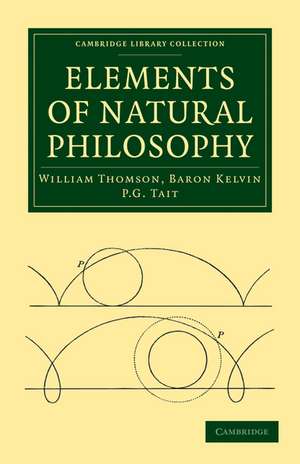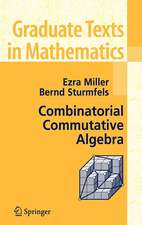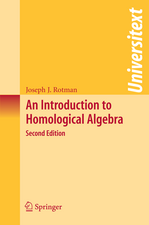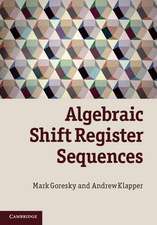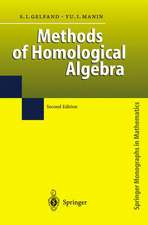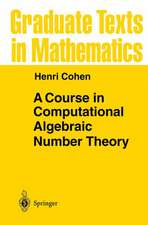Elements of Natural Philosophy: Cambridge Library Collection - Physical Sciences
Autor William Thomson, Baron Kelvin, Pg Taiten Limba Engleză Paperback – 9 iun 2010
Din seria Cambridge Library Collection - Physical Sciences
- 14%
 Preț: 595.05 lei
Preț: 595.05 lei - 23%
 Preț: 2112.84 lei
Preț: 2112.84 lei - 23%
 Preț: 833.69 lei
Preț: 833.69 lei - 23%
 Preț: 1134.09 lei
Preț: 1134.09 lei -
 Preț: 332.28 lei
Preț: 332.28 lei -
 Preț: 466.14 lei
Preț: 466.14 lei -
 Preț: 422.01 lei
Preț: 422.01 lei -
 Preț: 509.82 lei
Preț: 509.82 lei -
 Preț: 466.95 lei
Preț: 466.95 lei -
 Preț: 443.42 lei
Preț: 443.42 lei -
 Preț: 422.01 lei
Preț: 422.01 lei -
 Preț: 329.56 lei
Preț: 329.56 lei -
 Preț: 255.68 lei
Preț: 255.68 lei -
 Preț: 464.99 lei
Preț: 464.99 lei -
 Preț: 418.91 lei
Preț: 418.91 lei - 19%
 Preț: 461.39 lei
Preț: 461.39 lei -
 Preț: 520.98 lei
Preț: 520.98 lei -
 Preț: 369.45 lei
Preț: 369.45 lei - 19%
 Preț: 455.00 lei
Preț: 455.00 lei -
 Preț: 404.12 lei
Preț: 404.12 lei - 19%
 Preț: 455.62 lei
Preț: 455.62 lei -
 Preț: 338.14 lei
Preț: 338.14 lei -
 Preț: 282.18 lei
Preț: 282.18 lei -
 Preț: 375.39 lei
Preț: 375.39 lei -
 Preț: 465.60 lei
Preț: 465.60 lei -
 Preț: 329.56 lei
Preț: 329.56 lei - 19%
 Preț: 498.49 lei
Preț: 498.49 lei -
 Preț: 421.20 lei
Preț: 421.20 lei - 19%
 Preț: 499.85 lei
Preț: 499.85 lei -
 Preț: 252.96 lei
Preț: 252.96 lei -
 Preț: 361.56 lei
Preț: 361.56 lei -
 Preț: 246.75 lei
Preț: 246.75 lei - 19%
 Preț: 534.09 lei
Preț: 534.09 lei -
 Preț: 419.51 lei
Preț: 419.51 lei -
 Preț: 521.57 lei
Preț: 521.57 lei - 19%
 Preț: 455.92 lei
Preț: 455.92 lei -
 Preț: 471.36 lei
Preț: 471.36 lei -
 Preț: 352.34 lei
Preț: 352.34 lei -
 Preț: 420.82 lei
Preț: 420.82 lei -
 Preț: 419.66 lei
Preț: 419.66 lei - 19%
 Preț: 540.18 lei
Preț: 540.18 lei
Preț: 329.56 lei
Nou
Puncte Express: 494
Preț estimativ în valută:
63.06€ • 65.85$ • 52.07£
63.06€ • 65.85$ • 52.07£
Carte tipărită la comandă
Livrare economică 15-29 aprilie
Preluare comenzi: 021 569.72.76
Specificații
ISBN-13: 9781108014489
ISBN-10: 1108014488
Pagini: 296
Dimensiuni: 140 x 216 x 17 mm
Greutate: 0.38 kg
Editura: Cambridge University Press
Colecția Cambridge University Press
Seria Cambridge Library Collection - Physical Sciences
Locul publicării:Cambridge, United Kingdom
ISBN-10: 1108014488
Pagini: 296
Dimensiuni: 140 x 216 x 17 mm
Greutate: 0.38 kg
Editura: Cambridge University Press
Colecția Cambridge University Press
Seria Cambridge Library Collection - Physical Sciences
Locul publicării:Cambridge, United Kingdom
Cuprins
Division I. Preliminary: 1. Kinematics; 2. Dynamical laws and principles; 3. Experience; 4. Measures and instruments; Division II. Abstract Dynamics: 5. Introductory; 6. Statics of a particle. Attraction; 7. Statics of solids and fluids; Appendix.
Descriere
The essential introduction to the revolutionary physics of Sir William Thomson (Lord Kelvin) and Peter Guthrie Tait.
